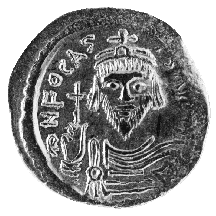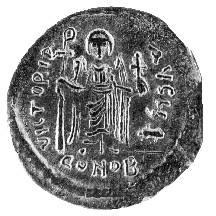



(134) Phocas - AV solidus, A.D. 602-610, 4.28 g. (inv. 91.274).
Obverse: Facing bust of Phocas, wearing paludamentum
and crown with cross, holding globus
cruciger in r.; D(OMINVS) N(OSTER) FOCAS PERP(ETVVS) AVG(VSTVS): Our
lord Phocas, perpetual Augustus.
Reverse: Standing angel facing, holding staff with Christogram
in r., globus cruciger in l.;
VICTORIA AVGV(STI): Victory of the Augustus; in exergue, CONOB: gold of
Constantinople.
Provenance: Frederick Knobloch, 1959.
Bibliography: P. Grierson, Byzantine Coins (London
1982).
In A.D. 602 Phocas, a junior officer of barbarian descent, led his troops
in a mutinous revolt against the imperial government and succeeded in taking
the throne. He initiated a reign of terror aimed particularly at the aristocracy,
and in the ensuing chaos the Persian army advanced on the Balkans and Asia
Minor. The situation was saved with the intervention of Heraclius, who deposed
Phocas.
The coins of Phocas are unusual because they revive an interest in portraiture,
which the engravers of the stylized portraits of most early Byzantine emperors
had long ignored. In contrast to the busts of other sixth-century emperors,
the portrait of Phocas emphasizes his barbarian heritage. His pointed beard
and his straight, shaggy hair give him a distinctly foreign appearance,
and he wears a simple crown and a military cloak, the paludamentum,
fastened with a fibula or pin on the right shoulder. His beard set
a precedent for most later emperors.
The inscription on the reverse abandons the usual legend VICTORIA AVCCC,
the abbreviation of the plural Augustorum indicating the joint rule
of more than one Augustus (see nos. 130-133).
In this period of sole rulers the legend had long been anachronistic, but
Phocas' decision to change it to refer to a single Augustus may have been
intended to emphasize his determination, in the face of mounting opposition,
to rule alone.
T.S.R.



All contents copyright (c) 1996.
Lawrence University
All rights reserved.